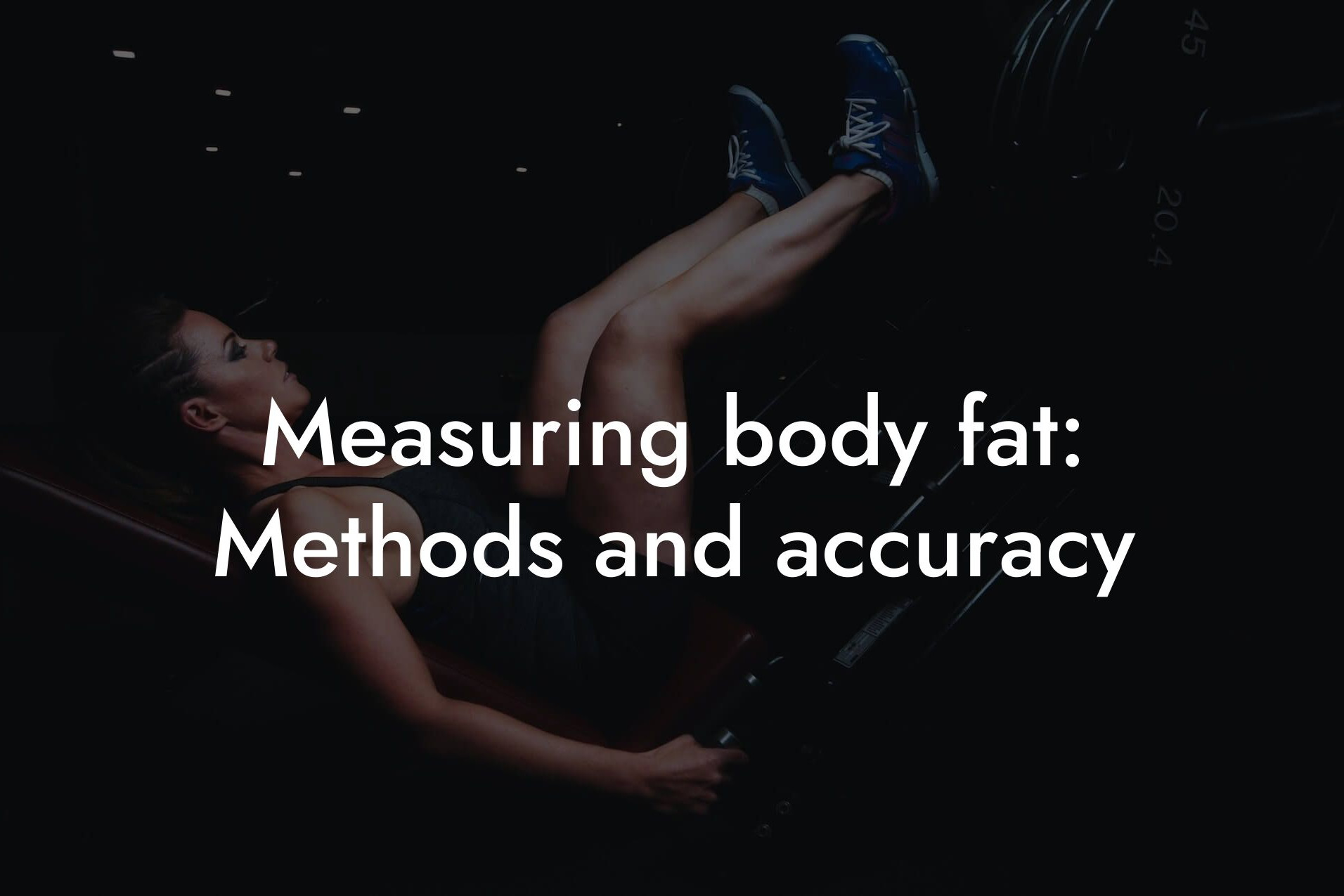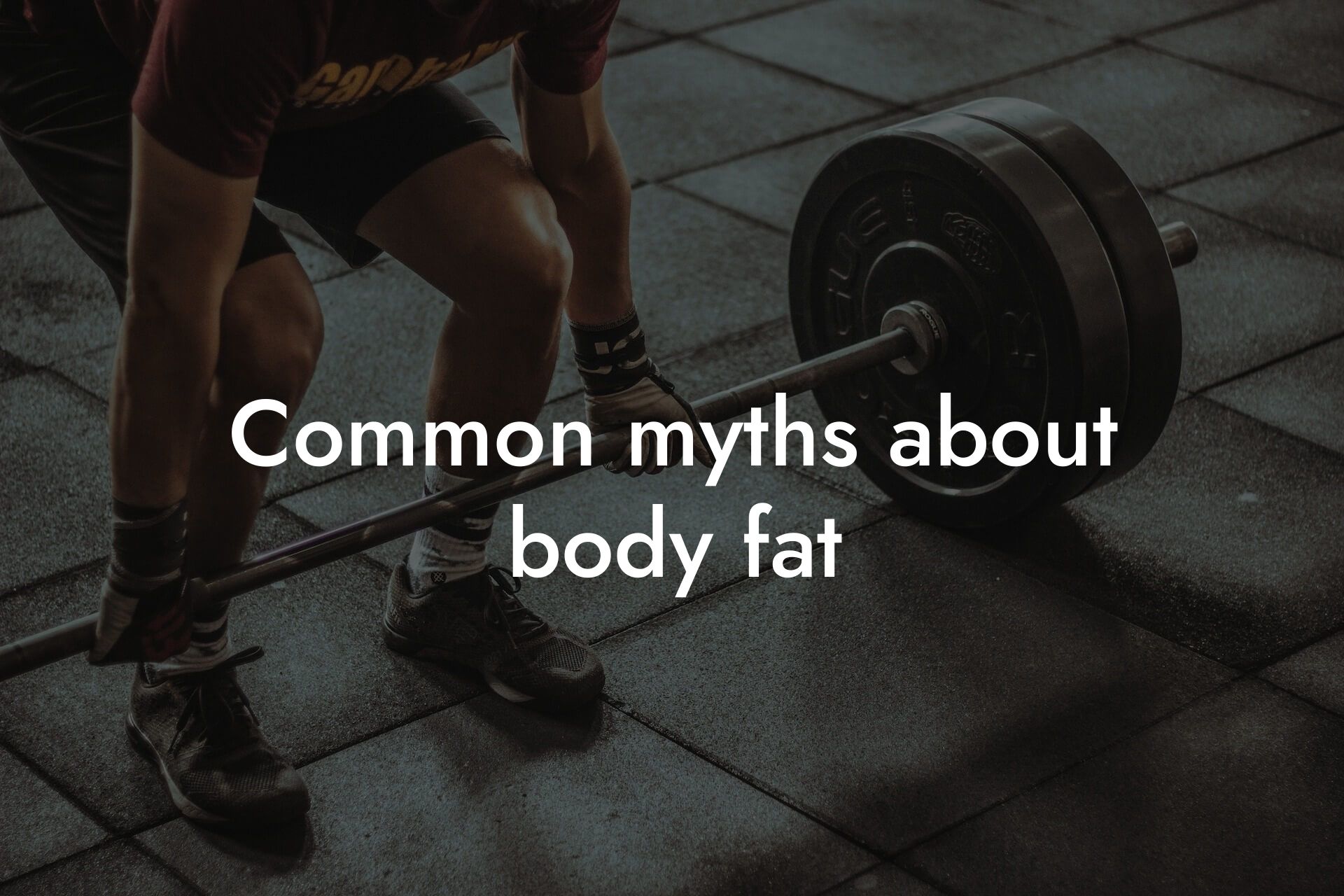As high-earning professionals, you understand the importance of maintaining a healthy physique. Not only does it boost your confidence, but it also enhances your overall well-being and productivity. At Tano Performance Group, we believe that a comprehensive approach to body fat management is crucial, and diet plays a vital role in achieving your goals. In this article, we'll delve into the significance of diet in managing body fat, providing you with valuable insights and practical tips to take your physique to the next level.
Table of Contents
Understanding Body Fat
Before we dive into the role of diet, it's essential to understand what body fat is and how it's measured. Body fat, also known as adipose tissue, is a type of connective tissue that stores energy in the form of fat. It's an essential component of our body, providing insulation, cushioning, and energy storage. However, excessive body fat can lead to various health problems, including obesity, diabetes, and cardiovascular disease.
At Tano Performance Group, we use advanced technology, such as DEXA scans, to provide accurate body fat measurements. This allows us to assess body composition, including lean mass, bone density, and body fat percentage, giving you a comprehensive understanding of your body.
The Impact of Diet on Body Fat
Diet is a critical factor in managing body fat. The food you eat provides your body with the necessary energy and nutrients to function optimally. A well-balanced diet can help you maintain a healthy body fat percentage, while a poor diet can lead to weight gain and fat accumulation.
When you consume more calories than your body needs, the excess energy is stored as fat. This can occur due to various factors, including overeating, consuming high-calorie foods, and leading a sedentary lifestyle. On the other hand, a diet that is high in nutrients and low in calories can help you lose weight and maintain a healthy body fat percentage.
Macronutrients and Body Fat
Macronutrients, including carbohydrates, proteins, and fats, play a vital role in managing body fat. Each macronutrient has a specific function, and understanding how they interact with your body is crucial for achieving your goals.
Carbohydrates are an essential source of energy for your body. They're broken down into glucose, which is then used to fuel your muscles and organs. Excess carbohydrates can be stored as glycogen or converted into fat. Focus on whole, complex carbohydrates, such as whole grains, fruits, and vegetables, to provide sustained energy and support weight loss.
Proteins are the building blocks of your body, essential for muscle growth and repair. They also play a role in satiety, helping you feel fuller for longer. Aim for 1.6-2.2 grams of protein per kilogram of body weight from sources like lean meats, fish, eggs, dairy, and plant-based options.
Fats are an essential source of energy and provide vital nutrients. They're also involved in hormone production and can help keep you full. Focus on healthy fats, such as avocado, nuts, and olive oil, and limit your intake of saturated and trans fats.
Micronutrients and Body Fat
Micronutrients, including vitamins and minerals, are essential for optimal body function. While they don't provide energy, they play a crucial role in regulating metabolism, hormone production, and overall health.
Vitamins, such as vitamin D and B12, are involved in energy production and can help support weight loss. Minerals, such as calcium and iron, are essential for bone health and energy production. A diet rich in whole foods, including fruits, vegetables, whole grains, and lean proteins, can provide adequate micronutrients for optimal body function.
Hormones and Body Fat
Hormones play a vital role in regulating body fat. Insulin, leptin, and cortisol are three key hormones that influence body fat storage and metabolism.
Insulin regulates blood sugar levels, and when it's out of balance, it can lead to fat storage and weight gain. Focus on whole, complex carbohydrates and avoid sugary drinks and refined foods to maintain healthy insulin levels.
Leptin is the "fullness hormone," helping you feel satisfied and regulating energy balance. A diet high in processed foods and added sugars can disrupt leptin levels, leading to overeating and weight gain.
Cortisol is the "stress hormone," released in response to stress and anxiety. Chronically elevated cortisol levels can lead to fat storage around the midsection. Engage in stress-reducing activities, such as yoga and meditation, and prioritize sleep to maintain healthy cortisol levels.
Meal Frequency and Body Fat
Meal frequency can impact body fat management. While there's no one-size-fits-all approach, research suggests that eating smaller, frequent meals can help regulate hunger and support weight loss.
Aim for 3-5 main meals and 2-3 snacks in between, spaced out every 2-3 hours. This can help maintain stable energy levels, reduce hunger, and support muscle growth and repair.
Hydration and Body Fat
Hydration is essential for optimal body function, including body fat management. Water helps regulate hunger, supports digestion, and can even boost metabolism.
Aim for at least 8-10 glasses of water per day, and avoid sugary drinks that can hinder weight loss efforts. Additionally, incorporate hydrating foods, such as cucumbers, tomatoes, and melons, into your diet.
Practical Tips for Managing Body Fat
Now that you understand the role of diet in managing body fat, here are some practical tips to help you achieve your goals:
- Focus on whole, nutrient-dense foods, including fruits, vegetables, whole grains, lean proteins, and healthy fats.
- Avoid processed and packaged foods, sugary drinks, and saturated fats.
- Stay hydrated by drinking at least 8-10 glasses of water per day.
- Eat smaller, frequent meals to regulate hunger and support weight loss.
- Get enough sleep (7-9 hours) to support hormone regulation and muscle recovery.
- Engage in regular physical activity, including cardio and strength training, to support muscle growth and fat loss.
- Monitor your progress with regular DEXA scans and adjust your diet and training program accordingly.
By incorporating these tips into your lifestyle, you'll be well on your way to achieving your body fat management goals. Remember, a comprehensive approach that includes a balanced diet, regular exercise, and stress management is key to achieving optimal body composition.
Frequently Asked Questions
What is the relationship between diet and body fat?
Diet plays a crucial role in managing body fat. The food we eat provides our bodies with the necessary energy and nutrients to function properly. When we consume more calories than our bodies need, the excess energy is stored as fat, leading to weight gain and increased body fat percentage. On the other hand, a well-balanced diet that is tailored to our individual needs can help us maintain a healthy weight and body composition.
How does diet affect body fat distribution?
Diet can influence where our bodies store fat. For example, a diet high in sugar and refined carbohydrates can lead to increased fat storage around the midsection, while a diet rich in healthy fats and protein can promote fat loss in this area. Additionally, a diet that is deficient in essential nutrients like omega-3 fatty acids and vitamin D can lead to increased inflammation and fat storage in the body.
What are the best foods for weight loss and fat burning?
Foods that are high in protein, fiber, and healthy fats, such as lean meats, fish, fruits, vegetables, nuts, and seeds, can help promote weight loss and fat burning. These foods are not only nutrient-dense but also tend to be more filling and lower in calories, making them ideal for those looking to lose weight and manage body fat.
Can a diet low in carbohydrates help with weight loss and fat burning?
A low-carb diet can be effective for weight loss and fat burning, especially for those who are insulin resistant or have type 2 diabetes. By reducing carbohydrate intake, the body is forced to rely on stored fat for energy, leading to increased fat burning and weight loss. However, it's essential to ensure that the diet is still balanced and provides adequate nutrients.
What is the role of macronutrients in managing body fat?
Macronutrients, including protein, carbohydrates, and fats, play a crucial role in managing body fat. Protein is essential for building and repairing muscle tissue, carbohydrates provide energy, and fats are necessary for hormone production and brain function. A balanced diet that includes the right ratio of macronutrients can help promote weight loss and fat burning, while also maintaining overall health.
How does protein intake affect body fat?
Protein intake plays a significant role in managing body fat. Adequate protein consumption can help build and maintain muscle mass, which can increase metabolism and promote fat burning. Additionally, protein takes more energy to digest than carbohydrates or fats, which can also contribute to increased calorie burn and weight loss.
Can a diet high in healthy fats help with weight loss and fat burning?
Yes, a diet high in healthy fats can help with weight loss and fat burning. Healthy fats, such as those found in avocados, nuts, and olive oil, can increase feelings of fullness and satisfaction, leading to reduced calorie intake and increased fat burning. Additionally, healthy fats are essential for hormone production and can help regulate metabolism.
What is the impact of sugar intake on body fat?
Sugar intake can have a significant impact on body fat. Consuming high amounts of sugar can lead to insulin resistance, inflammation, and increased fat storage around the midsection. Additionally, sugar can be addictive, leading to overconsumption and weight gain. Limiting sugar intake and focusing on whole, nutrient-dense foods can help promote weight loss and fat burning.
How does meal frequency affect body fat?
Meal frequency can impact body fat, with some research suggesting that eating more frequent, balanced meals can help increase metabolism and promote fat burning. However, it's essential to ensure that the meals are nutrient-dense and not high in calories, as overeating can lead to weight gain and increased body fat.
Can a diet that is high in fiber help with weight loss and fat burning?
Yes, a diet high in fiber can help with weight loss and fat burning. Fiber can increase feelings of fullness and satisfaction, leading to reduced calorie intake and increased fat burning. Additionally, fiber can help regulate blood sugar levels and promote healthy gut bacteria, both of which are essential for overall health and weight management.
How does hydration affect body fat?
Hydration can impact body fat, with even mild dehydration leading to increased hunger and decreased metabolism. Drinking plenty of water can help regulate appetite, boost metabolism, and promote fat burning. Additionally, hydration is essential for overall health and can help reduce inflammation and improve digestion.
What is the role of gut health in managing body fat?
Gut health plays a crucial role in managing body fat. A healthy gut microbiome can help regulate metabolism, reduce inflammation, and promote fat burning. Conversely, an unhealthy gut microbiome can lead to increased inflammation, insulin resistance, and weight gain. Maintaining a healthy gut through a balanced diet and probiotic supplementation can help promote weight loss and fat burning.
Can stress affect body fat?
Yes, stress can affect body fat. Chronic stress can lead to increased cortisol production, which can promote fat storage around the midsection. Additionally, stress can lead to overeating and poor food choices, further contributing to weight gain and increased body fat. Practicing stress-reducing techniques, such as meditation and yoga, can help mitigate the negative effects of stress on body fat.
How does sleep affect body fat?
Sleep can impact body fat, with chronic sleep deprivation leading to increased hunger, decreased metabolism, and weight gain. Getting adequate sleep is essential for regulating hormones, including insulin and leptin, which are critical for weight management. Aim for 7-9 hours of sleep per night to help promote weight loss and fat burning.
What is the impact of hormones on body fat?
Hormones, including insulin, leptin, and cortisol, play a significant role in managing body fat. Imbalances in these hormones can lead to increased fat storage, weight gain, and insulin resistance. Maintaining a healthy diet, getting regular exercise, and managing stress can help regulate hormones and promote weight loss and fat burning.
Can a diet that is high in antioxidants help with weight loss and fat burning?
Yes, a diet high in antioxidants can help with weight loss and fat burning. Antioxidants, such as those found in berries, leafy greens, and nuts, can help reduce inflammation and oxidative stress, both of which are associated with weight gain and increased body fat. Additionally, antioxidants can help regulate metabolism and promote fat burning.
How does exercise impact body fat?
Exercise is essential for managing body fat. Regular physical activity can increase metabolism, build muscle mass, and promote fat burning. Additionally, exercise can help regulate hormones, including insulin and leptin, which are critical for weight management. Aim for at least 150 minutes of moderate-intensity exercise per week to help promote weight loss and fat burning.
What is the role of portion control in managing body fat?
Portion control is critical for managing body fat. Eating large portions can lead to consuming excess calories, which can contribute to weight gain and increased body fat. Practicing portion control by eating until satisfied, rather than stuffed, can help reduce calorie intake and promote weight loss and fat burning.
Can a diet that is high in processed foods lead to increased body fat?
Yes, a diet high in processed foods can lead to increased body fat. Processed foods are often high in unhealthy fats, added sugars, and sodium, which can contribute to weight gain and insulin resistance. Additionally, processed foods are often low in essential nutrients, making it difficult to maintain a healthy weight and body composition.
How does mindful eating affect body fat?
Mindful eating can impact body fat by reducing overeating and increasing feelings of fullness and satisfaction. Practicing mindful eating by paying attention to hunger and fullness cues, eating slowly, and savoring food can help reduce calorie intake and promote weight loss and fat burning.
What is the role of supplements in managing body fat?
Supplements, such as protein powder, fish oil, and probiotics, can play a role in managing body fat. However, it's essential to remember that supplements are meant to supplement a healthy diet and exercise routine, not replace them. Always consult with a healthcare professional before adding any new supplements to your regimen.
Can a diet that is tailored to an individual's needs help with weight loss and fat burning?
Yes, a diet that is tailored to an individual's needs can help with weight loss and fat burning. Everyone's nutritional needs are different, and a diet that takes into account an individual's unique needs, preferences, and lifestyle can help promote weight loss and fat burning. Working with a registered dietitian or healthcare professional can help create a personalized diet plan that meets individual needs.
What is the importance of patience and consistency when it comes to managing body fat?
Patience and consistency are essential when it comes to managing body fat. Losing weight and reducing body fat takes time, and it's essential to focus on making sustainable lifestyle changes rather than quick fixes. Aim to make healthy changes that can be maintained in the long term, rather than trying fad diets or quick fixes that may not lead to lasting results.
Here are some related articles you might love...
- Measuring body fat: Methods and accuracy
- Ideal body fat percentage for professionals
- Common myths about body fat
- Body fat percentage by age and gender
- How body fat impacts overall health
- Body fat distribution: What it means for your health
- How to lower body fat percentage safely
- Body fat vs muscle mass: What matters more?
- The relationship between body fat and productivity
Zak Faulkner
Zak Faulkner is a leading authority in the realm of physical health and body composition analysis, with over 15 years of experience helping professionals optimise their fitness and well-being. As one the experts behind Tano Performance Group, Zak has dedicated his career to providing in-depth, science-backed insights that empower clients to elevate their physical performance and overall health.
With extensive knowledge of DEXA technology, Zak specializes in delivering comprehensive body assessments that offer precise data on body fat, muscle mass, bone density, and overall physique. His expertise enables individuals to make informed decisions and achieve their fitness goals with accuracy and confidence. Zak’s approach is rooted in a deep understanding of human physiology, combined with a passion for helping clients unlock their full potential through personalised strategies.
Over the years, Zak has earned a reputation for his commitment to excellence, precision, and client-focused service. His guidance is trusted by top professionals who demand the best when it comes to their health. Whether advising on fitness programs, nutritional strategies, or long-term wellness plans, Zak Faulkner’s insights are a valuable resource for anyone serious about taking their health and fitness to the next level.
At Tano Performance Group, Zak continues to lead our Content Team revolutionising how professionals approach their physical health, offering unparalleled expertise that drives real results.




